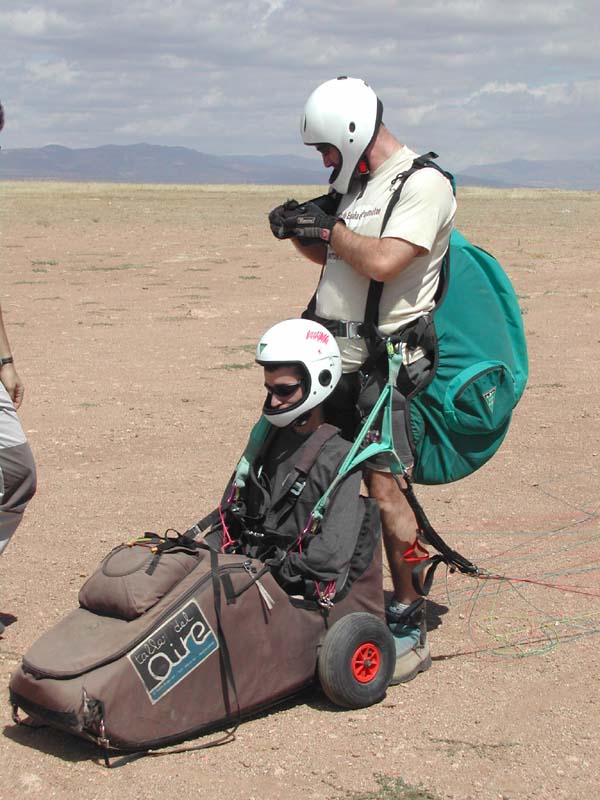Share:
Take it offline!
This Education in Motion resource is also available as a printable PDF.
Download PDF
Adventure sports are a lot of fun, but people with disability usually assume that they are inaccessible. While many adventure sports do pose access challenges, there are a number of adapted adventures sports and providers available that help make adventure sports accessible.
Why Adventure Sport Inclusion Matters
Adventure sports can be fantastic way to meet new people, make friends, keep fit, and set personal challenges. In Australia, where the weather is bright and sport is a big a part of national culture, disability accessible adventure sports are an important part of creating an inclusive society.

What’s Out There?
Indoor Skydiving
Skydiving is the epitome of adventure sports. There’s nothing quite like the feeling of flying. Traditional skydiving is often inaccessible to people with physical disabilities, because there are a number of significant dangers associated with the sport. But that doesn’t mean that there aren’t disability friendly options available. Indoor skydiving offers the weightless skydiving experience in a controlled environment with minimal risk, which means that it can be much more easily adapted to suited people with disabilities.
iFLY Downunder operates in Queensland, Victoria, and New South Wales and aims to make indoor skydiving as accessible as possible to people of all ages and abilities. Flyers are provided with a flight suit and helmet and take part in a brief orientation coaching session. Then, flyers enter a specially designed wind tunnel, where air can be controlled to ensure a safe flying experience.
While iFLY does all it can to support inclusion, it is firm on several safety exceptions. Flyers must not weigh more that 136kg, must not be pregnant, must be not be wearing a hard cast, and must not have previously dislocated one or both shoulders. Flyers with neck, back, or shoulder problems are advised to seek medical advice prior to indoor skydiving. All flyers are required to sign a Declaration of Risk form.
Bungee Jumping
Bungee jumping is another adventure sport must-do that most people assume is inherently inaccessible. Bungee jumping can be dangerous, so medical and ability disclosure is important, and policies are stringent. But in Queensland, AJ Hackett Bungy is able to provide some options for people with certain physical disabilities, including some wheelchair users, and people who are vision or hearing impaired. There are also spectator options for people who would prefer to watch others take the jump.
Scuba Diving
Scuba diving is a fantastic way to take in the wonders of the ocean. In Perth, Dive Unlimited specialises in providing scuba diving training and programs for people with disabilities.
Dive Unlimited is now a not-for-profit organisation, so it relies on volunteers and donations. It runs an accessible dive course that uses pacing and adaptations to deliver the same certified training program to divers with disabilities as would be provided to able-bodied people.
Go-Karting
Go-karting is a great high-speed adventure sport choice, and Le Mans Go Karts in Victoria offers an accessible experience. Le Mans offers a hoist to help people with physical disabilities to get in and out of go-karts. It has also introduced two modified go-karts, which enable adults with disabilities to drive in tandem with a carer, who is responsible for the control of the kart.
Mountain Biking
Mountain biking is often exclusive to people with physical disabilities, but adapted mountain biking is making the sport accessible.
Off-road handcycling is designed to suit people who are unable to ride standard, up-right, leg-powered mountain bikes. Handcycle bikes enable people with disabilities to control movement, speed, and direction using their hand cranks that move the bike’s front wheels. Moderate upper-body strength is required to use this equipment, but further adaptations are available for people with upper body impairments or quadriplegia. Tandem options are also available for people who are vision-impaired.
Adaptive mountain biking is now serviced by state events, and in other countries, adventure events and specific trails have been established for the sport. Organisers intend to continue to promote new competitive opportunities and the construction of an inclusive trail network.
Paragliding
Parability Paragliding Australia is a not-for-profit, volunteer-run organisation that develop, promotes, and delivers Tandem Paragliding Adventures for wheelchair users. Flights use a specialised ability chair to enable accessible tandem gliding.
Currently, Parability Paragliding Australia operates in two New South Wales locations, but it hopes to expand to other states in the future.
Rock Climbing
Rock climbing is typically assumed to be the domain of the able-bodied community, but there are some great disability accessible options. Adaptive Climbing Victoria is working to provide all abilities rock climbing experiences, using extra support harnesses and people power to improve accessibility.
Adaptive Climbing Victoria can provide rock climbing help to people with a range of disabilities, including wheelchair users and people with limb differences. The organisation also runs a number of accessible events. It’s not based in one particular location, so it visits a number of rock climbing centres, and it also facilitates some real-rock outdoor climbing events.
Surfing
The Disabled Surfers Association of Australia (DSAA) is a volunteer-run organisation providing surf education and programs to people with all kinds of disabilities. DSAA has branches in New South Wales, Queensland, Western Australia, Victoria, South Australia, and New Zealand.
What’s Next? The Sports Available in Other Countries
Around the world, accessible adventure sport availability is improving. These are some of the activities people with disabilities are enjoying:
Australian Disability Sports Organisations
To find out more about what Mobility Solutions Sunrise Medical offers, head to www.SunriseMedical.com.au